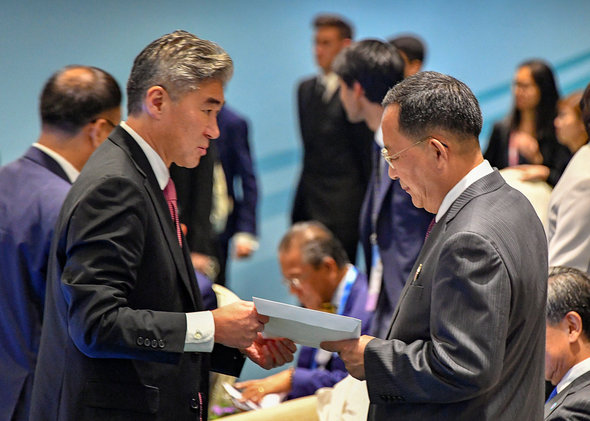 |
|
US Ambassador to the Philippines Sung Kim (left) delivers a letter written by US President Donald Trump to North Korean leader Kim Jong-un via North Korea’s Foreign Minister Ri Yong-ho during the ASEAN Regional Forum (ARF) at Singapore’s EXPO Convention and Exhibition Centre on Aug. 4. (Reuters)
|
North Korea’s expanded engagement with other countries indicates vivid change within regime
Despite intense speculation that the top diplomats of South, North Korea and the US might hold official bilateral meetings during the 25th ASEAN Regional Forum (ARF), these meetings did not occur. But the three countries held on to the hope of dialogue despite the current impasse, with the South and North Korean Foreign Ministers holding an informal “standing meeting” while North Korea and the US engaged in some “letter diplomacy” between their two leaders. North Korea held bilateral meetings with 12 countries during this year’s forum – four times as many as last year – offering a vivid example of how much has changed since the North’s summits with South Korea and the US. South Korean Foreign Minister Kang Kyung-wha and North Korean Foreign Minister Ri Yong-ho’s meeting took place during the gala dinner on the evening of Aug. 3, on the eve of the official forum. During this meeting, Ri said he was “not in a position to engage in a foreign ministers’ meeting.” During a press conference summing up the results of the forum in Singapore on Aug. 5, Kang avoided specific comments and only said that Ri’s “position is that it’s not yet time for the diplomats to come forward.” Ri’s apparent view is that the negotiations have not gotten specific enough for North Korean diplomats to take over because of the ongoing dispute between North Korea and the US over the order and method of implementing the joint statement reached during the June 12 summit. “Since Foreign Minister Kang and Foreign Minister Li have not played a major role in denuclearization negotiations to date, there must have been some discomfort with the idea of holding an official meeting,” said Cho Sung-ryul, senior research fellow for the Institute for National Security Strategy. ”Standing diplomacy” and “letter diplomacy” The “standing diplomacy” between North Korea and the US occurred at the conference hall on the afternoon of Aug. 4. During the process of taking a commemorative photo, US Secretary of State Mike Pompeo approached Ri and greeted him with a smile. The scene of US Ambassador to the Philippines Sung Kim handing Ri the letter that Trump wrote to Kim was broadcast live by the press. This was a reply to Kim’s second letter to Trump, which had been delivered recently. Pompeo tweeted that he had a “quick, polite exchange” with Ri. “Our US delegation also had the opportunity to deliver [Trump’s] reply to Chairman Kim’s letter,” he wrote. Despite the lack of an official bilateral meeting, the US appears to be attempting to maintain the momentum for dialogue by underscoring the fact that it made contact with North Korea, as well as through “letter diplomacy.” “The top-down method has been in play since the very beginning, so this is a symbolic way of showing that the leaders’ confidence remains strong even if there are some hitches [at a lower level],” said Koh Yu-hwan, a professor at Dongguk University. With North Korea-US relations at a standstill, the US continued to pressure the North while leaving the door to dialogue open at the forum. Pompeo said he was “optimistic” about North Korea’s denuclearization during the press conference on Aug. 4 but also emphasized the importance of putting diplomatic and economic pressure on the North in order to achieve “final, fully verified denuclearization.” Amid all this, North Korea also raised eyebrows with its aggressive diplomatic efforts at the forum. From Aug. 3 to 4, Ri held bilateral meetings with a total of 12 countries and regions, including China, Thailand, Vietnam, Laos, Indonesia, Myanmar, the Philippines, the EU and New Zealand. This was quite a change from last year’s forum, when North Korea only sat down with three countries, China, Russia and the Philippines, the last of which was the forum’s host country. During his forum speech, Ri emphasized North Korea’s need for a peaceful environment on the Korean Peninsula and the surrounding area to achieve the North’s strategic line of focusing all its efforts on building a socialist economy. During the bilateral meetings, he is assumed to have asked each country for cooperation and assistance. During the forum, South Korea, North Korea, the US and China also discussed declaring an official end to the Korean War. “We had significant deliberations with the US and China” about the topic, Kang said. By Kim Ji-eun and Noh Ji-won, staff reporters Please direct comments or questions to [english@hani.co.kr]






